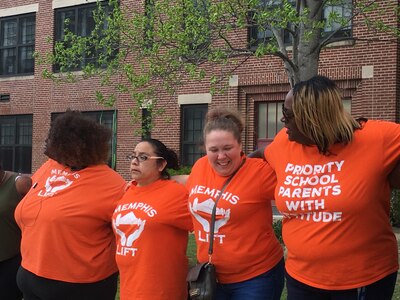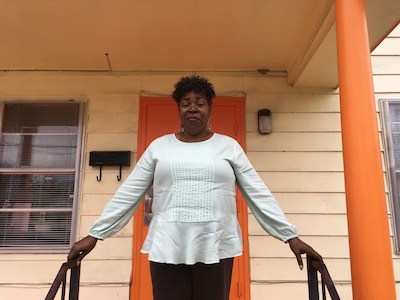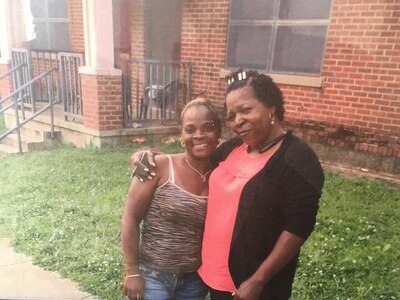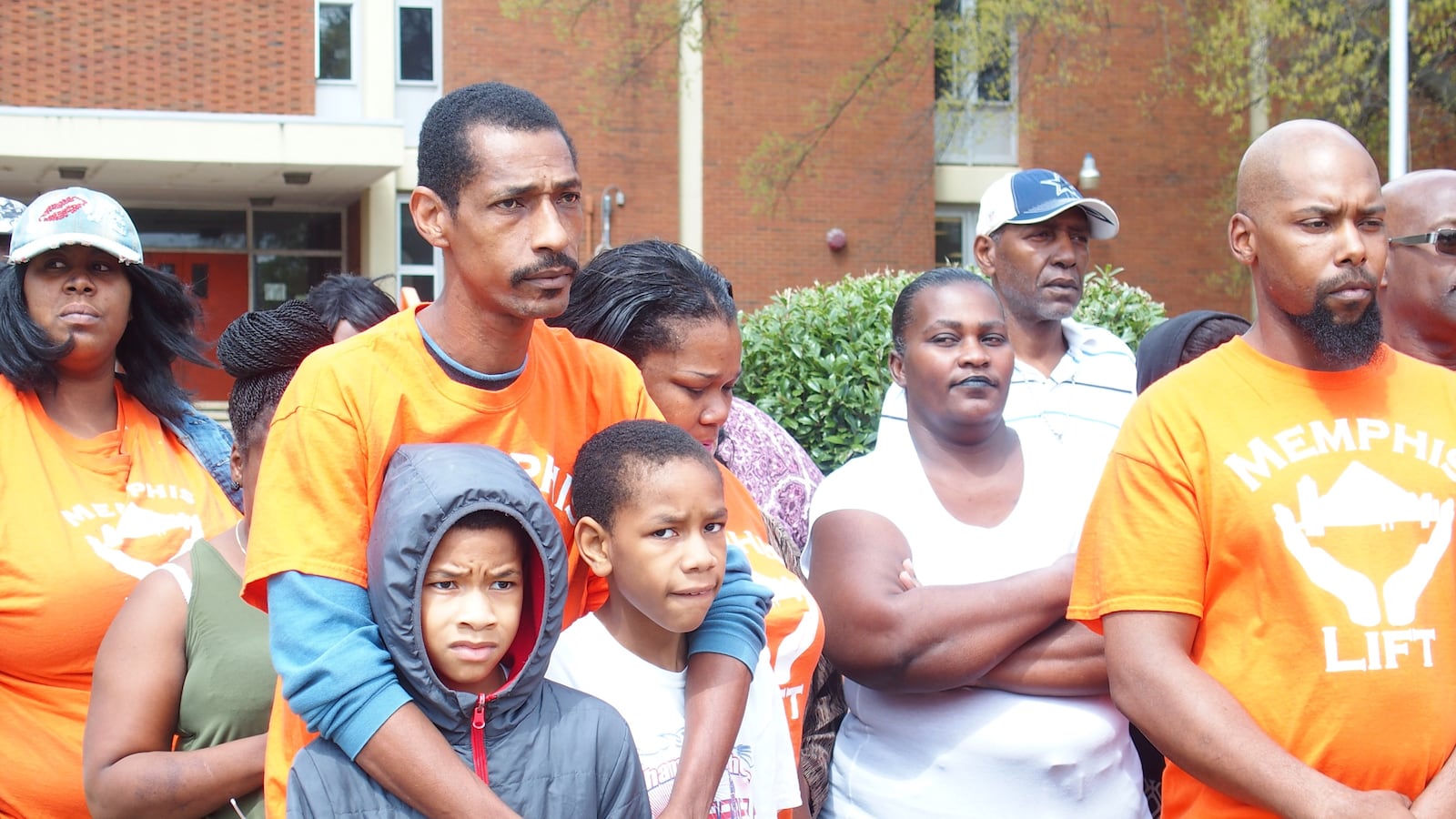Adorning one hall of the North Memphis headquarters of Memphis Lift, photos chronicle the parent advocacy group’s meteoric rise from obscurity to influence on the city’s education landscape over the course of two years.
One snapshot captures founding executive director Sarah Carpenter posing with a public housing resident as the group canvassed its first neighborhood to show parents the data behind Memphis schools, especially those in the state’s bottom 5 percent.
Others display proclamations from Memphis Mayor Jim Strickland and several state lawmakers recognizing the group’s advocacy work in behalf of families.
As Memphis Lift prepares to mark its second anniversary this weekend with a school supply giveaway at its headquarters, it’s showing the power of parental involvement in a city that historically has struggled to engage families in public education.
With 17 employees, the organization has shepherded 200 parents through its fellowship class, teaching them how to become more effective advocates in their children’s schools. The program includes a recent inaugural cohort of Hispanic parents, a growing population that often gets lost in the complexities of the city’s increasingly splintered education landscape. The group’s rosters also boast more than a thousand parents interested in community meetings and school tours, including about 100 who have sought guidance for how to choose the best school fit for their children.
“Parent involvement has been the missing piece for decades in Memphis schools,” Carpenter said. “Parents weren’t involved and parents weren’t even educated about how to advocate for their kids. Schools shut parents out.”
In its early stages, Memphis Lift was viewed warily by some local school leaders who doubted the group’s independence because of its close relationship with Natasha Kamrani, former director of Tennessee’s branch of Democrats For Education Reform and wife of Chris Barbic, founding superintendent of the Achievement School District. The organization was a rare advocate of the state-run district as protests erupted annually over the ASD’s heavy-handed takeover of neighborhood Memphis schools beginning in 2012.

But the organization has increasingly shown its maverick side. This spring, members marched and protested when the ASD announced plans to close its first charter school. Klondike Preparatory Academy. And while they lobbied county commissioners last year for more funding for Shelby County Schools, they also spoke out this summer against granting an early contract extension for Dorsey Hopson, the district’s superintendent. Only weeks later, Hopson participated in the group’s monthly speaker series, drawing a warm reception as he spoke about the state of the district.
The group is funded mostly through the Memphis Education Fund, a philanthropic collaborative that seeks to support local public education, but also gets support from Bloomberg Philanthropies and the Walton Family Foundation. (Chalkbeat also receives support from local philanthropies connected to Memphis Education Fund and the Walton Family Foundation. You can learn more about our funding here.)
Carpenter spoke with Chalkbeat about the evolving scope of Memphis Lift’s work, the hurdles to parent engagement in Memphis, and the interactions with students and parents that have inspired her. (This interview was edited for clarity and brevity)
When Memphis Lift came on the scene, many people doubted its legitimacy as a grassroots organization because of its ties to the ASD and its early paid advocacy work. How would you describe your mission now?
Natasha (Karmani) was not looking for parents that had everything they needed. She was looking for real parents that had challenges in life and still have challenges — and me being one of them. Ordinary parents from communities with limited resources. When they came to me, I had seen it all. I had worked with a lot of different people that used me to get what they needed, then kicked me to the curb. Memphis Lift is not like that.
We want to make sure that when a parent walks into a school, somebody in that building drops everything and helps that parent. Because we send our best to those schools. It may not be the best to you, but it’s the best that we got, and we expect you to treat them like it’s the best that you got.
What have been the most valuable lessons Memphis Lift has learned?

Sometimes you have to pivot away from your mission statement just a little bit. Parents have underlying issues that we have also had to deal with. Many of our parents are single parents and have trouble paying bills. So we help parents find resources they need. When you deal with that, then parents are more able to advocate for their child at school. We believe a great education can help with a lot of that for the next generation. I think we have more parents now who know how to fight for a great education for their children.
We’ve also learned about building strong, meaningful relationships. We broke a key barrier by connecting with Dorsey Hopson. We don’t just deal with charter parents and ASD parents; many are parents with Shelby County Schools. Our story is so real now, they can’t help but talk to us. When Hopson came to our speaker series, people were glad to see him.
Parent engagement has been a challenge for all school systems in Memphis. What will it take for schools to increase parent involvement?
They’ve got to let parents speak their truth. They’ve got to listen to parents. We’re working with some schools that let us come in and talk to parents. Most of our complaints this past school year were about how their kids are being treated in school like bullying from teachers. Parents have found their voice to say this is not right.
But parents have to be educated on the right way to advocate for their children. We have not known how to advocate for so long. It’s hard to reach some parents to make them feel like their voice does matter.
How have you seen parents go from knowing little about their school and child’s education to becoming advocates?
I often get calls from parents telling me about how they were able to fix a problem at their child’s school because they were informed about their rights. The powers at be were so used to parents not knowing their rights and they want to keep it that way. Parents haven’t felt like they weren’t able to do these things. And now they go in the school and ask those tough questions. I don’t care if you’re (Chief of Schools) Sharon Griffin, Dorsey Hopson, (ASD Superintendent) Malika Anderson or a charter school. All you want is for kids to get what they need. And guess what? If you give them what they need, they won’t leave your school.
What solidified why you’re doing this work?

Growing up hearing about Foote Homes, it was one of those places you couldn’t go. We went there. We took a team of people to Foote Homes because LaRose Elementary was on the priority list at the time. And we were asking parents the basic questions: Are you aware your children are going to a school in the state’s bottom 5 percent? Most of the parents we talked to weren’t aware.
We went there in the midst of everything. People were shooting dice and not knowing what might break out. I remember this white teacher and this little black boy were throwing a football around in the middle of the apartments and that boy was just focused on his teacher. And that stayed in my head until today. That child was so focused on that teacher and that football to the point he didn’t care what was going on around him. And that was a moment for me.
And people were asking us, “Well if it’s a failing school, what are we going to do?” We were all new to this. We’d never done this before. And we didn’t know, but we knew we had to do something. That’s how the “choice counseling” came on board. And now parents are knocking on our door asking us to help them find their kids a great school.

